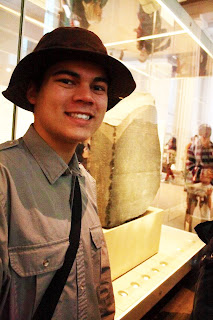Most people have some idea, to a greater or lesser
extent, of what the economy is. However,
a lot of confusion exists. A friend once
encouraged me to watch a video on YouTube because it “had to do with economics”. In reality, it was just a video about “sustainability”
and anti-corporatism. It was an honest
mistake, but upon reflecting later, I realized that it might be good to do a
post telling what the economy is and is not.
A long
time ago, when civilization was mostly tribal, there was not much of an “economy”
as we know it. People would grow food,
hunt food, gather food, and perhaps go to war if they were bored. At some point, people realized that different
people were good at different things. Some
were good at farming, others at making tools, and still others at yet other
skills. This gave rise to what we call
the “division of labor”. In a society that operates with a division of labor,
people do what they are good at doing and trade with others for what do not
do. A smith would make tools and trade
with the farmer for food. They would
both be better off in the end because they were able to procure something that
they didn’t have to make themselves and only had to do the one thing that they
were good at. The division of labor
gives rise to a social system characterized by specialization and trade. The extra benefit of specialization is that
when a person focuses on one vocation, he is able to acquire more and more
skill, as well as innovate in his field.
This is the time in history when we see the first big jumps in
technology.
Fast
forward to a later point in humanity’s history and we see the invention of
money. What is money and why was it
made? There was a need for some medium
that could store value permanently. This
need is perhaps most clearly seen in farmers who, in the absence of a method of
storing value, could only trade during the times that they had a fresh
harvest. In those times, they had
plenty, but the stocks did not last long enough that they could trade for other
necessities during the rest of the year.
Another problem with a society based solely on trading is: what if the
person you want to buy from does not want the good that you have to offer. The trade gets even more complicated when
attempting to trade something of little value, say corn, for something of great
value, a guitar. What if the guitar is
worth a couple thousand ears of corn and the guitar maker won’t trade for it
because he does not want to have to deal with carrying around those thousand
ears? Yet there is a rub because guitars
by nature cannot be divided into some smaller segment that can be traded for
fewer ears. Money was invented to solve
all of these problems. Whatever form it
has taken throughout history, money has shared these characteristics: it holds
value permanently, is easily divisible into smaller parts, and is universally (or
at least widely) accepted by everyone in a region. With the creation of money, people were able
to specialize even more because they did not have to worry about their product
being immediately marketable to an end user.
 |
| Ludwig von Mises, author of "Human Action" |
Adam
Smith wrote about the growth of a society from specialization and trade in 1776
in his book The Wealth of Nations.
This sparked the Industrial Revolution which saw specialization increase
to such an extent that a person’s sole occupation might be the creation of a
firing pin of a gun. Trade expanded too so
that each country could take advantage of its own natural resources and the
skills of its labor force and trade with other countries for their
products. This is where we get the idea
of an “economy”. An economy is the sum
of the resources that are used and the products that are made and the processes
by which they are exchanged in a society as well as the actions of the people
who participate in them. Civilization
has progressed a long way since the days of hunters and gatherers and has
become nuanced enough that no one person or group of individuals can hope to
understand it fully, but it does not keep us from trying. Economics at its very
core is the study of human action, how people use resources for the betterment
of themselves and of humanity.


